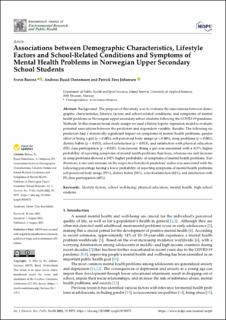Associations between Demographic Characteristics, Lifestyle Factors and School-Related Conditions and Symptoms of Mental Health Problems in Norwegian Upper Secondary School Students
Peer reviewed, Journal article
Published version
Permanent lenke
https://hdl.handle.net/11250/3053750Utgivelsesdato
2022Metadata
Vis full innførselSamlinger
Originalversjon
International Journal of Environmental Research and Public Health (IJERPH). 2022, 19 (15), 9575-?. 10.3390/ijerph19159575Sammendrag
Background: The purpose of this study was to evaluate the associations between demographic characteristics, lifestyle factors and school-related conditions, and symptoms of mental health problems in Norwegian upper secondary school students following the COVID-19 pandemic. Methods: In this cross-sectional study design we used a binary logistic regression model to evaluate potential associations between the predictors and dependent variable. Results: The following six predictors had a statistically significant impact on symptoms of mental health problems; gender effect of being a girl (p < 0.001), self-perceived body image (p < 0.001), sleep problems (p < 0.001), dietary habits (p = 0.033), school satisfaction (p = 0.013), and satisfaction with physical education (PE) class participation (p = 0.025). Conclusions: Being a girl was associated with a 315% higher probability of reporting symptoms of mental health problems than boys, whereas one unit increase in sleep problems showed a 192% higher probability of symptoms of mental health problems. Furthermore, a one unit increase on the respective beneficial predictors’ scales was associated with the following percentage having a lower probability of reporting symptoms of mental health problems; self-perceived body image (59%), dietary habits (58%), school satisfaction (82%), and satisfaction with PE class participation (68%).

